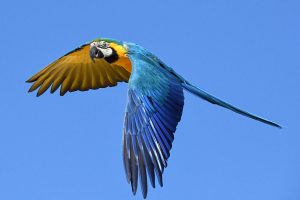 There once was a time when the skies of Rio de Janeiro were filled with the colorful and noisy flight of blue-and-gold macaws. And while their population is indeed decreasing (according to the IUCN assignation for the species), they are listed by the watch organization as Least Concern for their conservation status. But the blue-and-gold macaw has disappeared in the Rio de Janeiro region where it has been quite some time since one has been seen in the wild there—until a wild blue-and-gold macaw found the zoo in Rio de Janeiro where others of her kind live. For the last 20 years, a lone macaw named Juliet (by the zoo) has visited the zoo’s macaw population every morning before flying off for the evening. The caregivers at the zoo aren’t sure of the sex of Juliet because it’s impossible to determine by a glance. But they have simply assumed it’s a female and let Juliet do as it will.
There once was a time when the skies of Rio de Janeiro were filled with the colorful and noisy flight of blue-and-gold macaws. And while their population is indeed decreasing (according to the IUCN assignation for the species), they are listed by the watch organization as Least Concern for their conservation status. But the blue-and-gold macaw has disappeared in the Rio de Janeiro region where it has been quite some time since one has been seen in the wild there—until a wild blue-and-gold macaw found the zoo in Rio de Janeiro where others of her kind live. For the last 20 years, a lone macaw named Juliet (by the zoo) has visited the zoo’s macaw population every morning before flying off for the evening. The caregivers at the zoo aren’t sure of the sex of Juliet because it’s impossible to determine by a glance. But they have simply assumed it’s a female and let Juliet do as it will.
Looking for Romeo?
It’s not exactly clear as to why Juliet visits the zoo every morning, but the likely reality is that “she” is lonely and is looking for companionship. Upon arrival in the morning, Juliet navigates the skies to the enclosure that houses other blue-and-gold macaws. Once there, she engages in behavior that indicates that she is interested in a little more than just company. Juliet does this through the enclosure’s fencing. The authorities at the zoo think that loneliness has compelled Juliet to seek a companion in the only place that she may think they exist. She might also be exclusively interested in one of the caged birds.
While many large birds have long lifespans, the lifespan of a blue-and-gold macaw is listed as approximately 30-35 years. Given that Juliet has been visiting the park enclosure for 20 years, it’s realized that Juliet is well advanced in age.
The blue-and-gold macaw is a beautiful bird. It can reach large sizes by weight and length. The bird has been measured as being near 3 feet in length at its mature stage. Once can weigh in at around 2-3 pounds. They get their name by the bright yellow body feather and the bright blue feathers that make up their wing region.
Reintroducing Macaws in Rio
The Rio de Janeiro-based zoo that Juliet visits is known as BioParque Do Rio. It currently has a plan in place to reintroduce blue-and-gold macaws back into the wild of the region. BioParque has aligned with another institution, Refauna, which is an organization that seeks to repopulate protected forestry with displaced creatures in order to reestablish a dwindling eco-system. With their joint venture, the hope is that they can produce 20 macaw chicks. BioParque and Refauna will work to train the chicks to rely only on food sources found in the forest. They will also train the chicks to develop a natural awareness of predators and other dangerous things that could threaten their existence. The intent is to release the trained macaws into the Tijuca Forest National Park in the hopes that the magnificent bird will thrive once again. The plan for reintroduction is at the end of 2022.
We sincerely hope the best for Juliet. We hope that she will find companionship and produce heirs for the skies of Rio.
